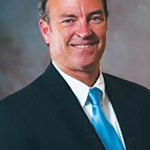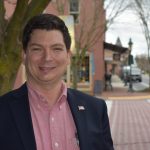FY21 will see infrastructure, reserve fund get attention
By Ally Lanasa, Staff Writer
(Jan. 7, 2021) Finances, Heron Park, a community center and utility infrastructure are the priorities that Berlin’s elected officials hope to tackle in 2021.

Mayor Zackery Tyndall
Mayor Zackery Tyndall, who began his first term in October 2020, said he has adopted “more of a hands-on management approach throughout town.”
“I’ve taken the time to meet with every department and try to better understand how they operate and discuss their short- and their long-term needs,” he said. “I’ve also made it a point to meet with the councilmembers to hear their concerns and talk about what they believe are maybe the top needs for each of their respective districts and how they see the issues for the town as a whole.”
Tyndall said common themes of discussion with the council members are the budget and how to support businesses throughout town.
“The biggest thing is going to be the budget, and everything that includes,” Councilman Jack Orris said.
The Town Council plans to adopt a formal reserves policy and begin allocating funds to the reserves this year.
“Reserves policy was something I campaigned on and it’s something that I’d like to see happen,” Orris said.
Councilman Troy Purnell and Councilman Jay Knerr emphasized the importance of establishing a reserves fund to protect the town financially if a significant need or disaster occurs.
“The town does need to adopt a formal reserves account,” Tyndall said. “It’s been previously talked about as a policy … some way to bind the funds so it requires council action to take money out of that reserves fund. That’s something you can expect to see in the early phases of 2021.”
Orris added that he would like to offer a quarterly report or newsletter to Berlin residents about the town’s budget.
The mayor and council will have open work sessions about the general fund and the enterprise funds for FY22 as well as review requests from department heads, the Berlin Fire Company and Atlantic General Hospital.
“We’ve started doing those quarterly reports, so we’ve got a decent idea where we are,” Purnell said. “We just got done the PKS review as well as Jean Holloway gave us her presentation. They gave us some pretty good insight into we’re going to need to spend some money on those enterprise funds.”
Jean Holloway, from Southeast Rural Community Assistance Project Inc. (SERCAP) in Delaware and Eastern Maryland, told Berlin officials on Dec. 14 that the gap between the water the town pumps and the water it bills needs to shrink to avoid a deficit.
Holloway said town officials should increase rates to make up for the projected deficit until a cost recovery rate can be adopted. She also recommended the town staff develop a plan and timetable to replace water meters and associated software.
As for the sewer fund, Holloway and PKS partner Michael Kleger and manager Leslie Michalik agreed that the sewer rates need to be monitored and increased to eliminate the existing debt.
Berlin’s sewer utility has lost money for years because of the low rates, which were subsidized by funds borrowed from the general fund reserves. In August 2020, the council agreed to write off half the $3.4 million the town’s separate sewer fund owes the general fund, while committing to repay the remaining $1.7 million to the general fund over 10 or more years.

Troy Purnell
Purnell said the council needs to evaluate “what it’s going to cost to run everything operationally and not lose any money.”
Tyndall said in years past the town’s approved budgets have not included items for capital to address aging infrastructure.
“The utility funds are going to be a big part of the budget process that’s upcoming,” he said. “So, one of the most important jobs that I have over the next few months is to create a FY22 budget that’s balanced, and part of that includes capital needs for each department and the fact that our utility funds really do have some concerns that need to be addressed.”
Similar to Tyndall’s stance during the FY20 budget process, Knerr aims to prioritize keeping taxes low in the FY22 budget cycle.
“I want to make sure we hold our taxes in check and do not have an increase this year,” Knerr said, regarding the property tax increase to $.80 per $100 of assessed value in FY20. “I will be doing everything I can to prevent that or vote against it because I think the town of Berlin residents have paid their dues.”
Purnell believes it will be a challenging budget process.
“Nobody wants to talk about increasing anything, but I think the reality is, it’s pretty in-our-face from our experts,” he said.
In addition, Knerr hopes the town can switch all its diesel engines to natural gas at the Berlin power plant on William Street in the long-term.
“They’re much more energy-efficient. They produce more energy,” he said. “If there’s possible grants for that, we need to seek them out and start that process as well.”
In July 2019, the second engine out of four at the power plant was taken out of commission when a piston connecting rod failed on the 16-cylinder engine and knocked a hole in the side plate of the engine. The engine was at least 20 years old. The replacement natural gas CAT G3520 EPA certified generator set was commissioned in September 2020.
Berlin councilmembers also hope to continue progress at Heron Park.
“Heron Park, I believe, is going to be a high priority,” Orris said. “I believe Mayor Tyndall indicated that we do have $200,000 in debt service that we’re doing on that, and that’s just a lot to sustain with no revenue coming in for that property.”
Knerr said some master plans have been drawn that the mayor and council should examine to move forward with the project.
“I know there’s a grant in play to tear down the [former Tyson plant] building,” Knerr added. “We need to follow through and make sure that happens and see how we can best utilize that land because there is a lot of land area there.”
Knerr also stressed the need for a community center in Berlin.
“The one that is currently there is in deplorable condition,” he said. “It needs to be torn down. However, Berlin doesn’t own that land.”

Jay Knerr
The Multipurpose Building on Flower Street, which the town plans to transform into a new community center, is currently owned by the Berlin Community Improvement Association.
“However, on the corner of Flower Street and Route 376 (Assateague Road), Berlin owns three acres there, so we could put a community center with funds … we have the land. We have some money ready to go, so we need to start developing plans.”
The Multipurpose Building is the site of the former Flower Street School and is in walking distance to Dr. William Henry Park.
“I think that’s going to be something we’re going to have to sit down and talk to some of our community partners about and see how we can fund such an endeavor and what we’re going to do to remember the history and honor the history, but also look ahead to the future,” Orris said. “So, we’re going to have to figure out a way to do that.”
Tyndall hopes to work with the Berlin Community Improvement Association to revitalize the building that has functioned as a polling place for municipal elections as well as a meeting place for town community meetings over the years.
“There’s definitely some hurdles that we need to overcome with transitioning that property to the town and figuring out an agreement between the [Berlin Community Improvement Association] and the town for how that property is going to be moving forward,” Tyndall said.
Another priority for the council is addressing stormwater issues.
“Flooding is an issue all around town. As a District 2 representative, although I represent the whole town, flooding affects a lot of

Jack Orris
folks in that particular area,” Orris said. “So, that’s a concern and a high priority for me personally as a councilmember.”
Knerr agreed, saying the town should apply for grants to correct the low-lying areas, so stormwater does not flow into streets or residents’ properties.
As for short term goals, Tyndall said the council will focus on the beautification of town, such as increasing routine maintenance of parks and playgrounds and improving landscaping.
“It’s just getting back to the basics of making sure that our town’s a beautiful place to live, work, visit and hopefully invest,” he said.
Orris, who works for the Worcester County Health Department, said he is most concerned about making sure Berlin citizens and employees stay healthy and return to some sense of normalcy as quickly and as safely as possible.
Tyndall said officials will also consider how the local government plays a role in the business community and “help create an environment where businesses can thrive not just during covid but after covid.”
Amid the impact of the coronavirus on the small town, Purnell is most of proud of “keeping the businesses moving, keeping the wheels turning.”
The Berlin Mayor and Council held a work session virtually with District 38 legislators on Dec. 17, during which Tyndall asked the politicians to act for the town to seek any supplemental covid-19 financial support that be or become available.
